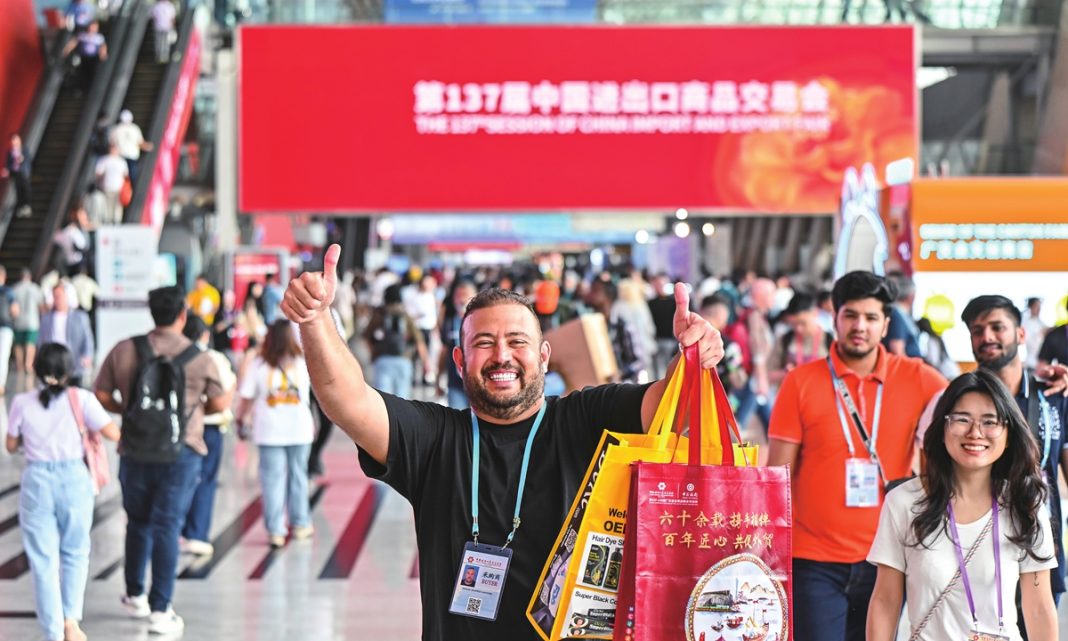BEIJING: A joint statement was issued following the China-US economic and trade talks in Geneva, Switzerland. Both sides promised they will establish a mechanism to continue discussions on bilateral economic and trade relations.
On May 14, the US canceled 91 percent of its additional tariffs, and China reciprocated by removing 91 percent of its counter tariffs. The US also suspended 24 percent of its “reciprocal tariffs,” to which China responded by suspending 24 percent of its retaliatory duties.
Described as “in-depth, candid and constructive,” the Geneva talks yielded “substantial progress” and important consensus between China and the US, drawing significant attention from the international community.
In a world of turmoil, free trade serves as a “barometer” of the global economy. Firmly upholding the principle of free trade and defending the multilateral trading system are essential to bringing certainty and stability to global development.
Chinese President Xi Jinping has emphasized, “We must unswervingly manage our own affairs well, and stay committed to expanding high-standard opening up.”
The international community views China as the biggest flag-bearer of trade and investment liberalization and facilitation in today’s world, and a stabilizing force in turbulent world.
Free trade is a key channel for such openness and cooperation.
China is building a globally oriented, high-standard network of free trade zones (FTZs), accelerating the development of pilot FTZs and the Hainan Free Trade Port (FTP)… The country is committed to a more proactive strategy of opening-up, steadily expanding institutional openness, and developing a new system for a higher-level open economy.
The China-Singapore Free Trade Agreement Further Upgrade Protocol and the China-Maldives Free Trade Agreement have taken effect. The Regional Comprehensive Economic Partnership (RCEP) marks its third year of implementation. As the world’s largest and most promising free trade agreement (FTA) by population and trade volume and the greatest development potential, RCEP has become the main channel for economic integration in the Asia-Pacific region.
Moreover, in April this year, China and Azerbaijan expressed their willingness to launch negotiations on a free trade agreement to provide high-level institutional support for deeper trade and investment cooperation. Switzerland has also expressed readiness to strengthen cooperation with China in a rational and pragmatic manner and accelerate negotiations on upgrading the bilateral FTA for substantive progress.
President Xi has stressed that history tells us that openness and cooperation are a major driving force behind dynamic international economic and trade activities.
As a major trading partner to more than 150 countries and regions, China has signed 23 FTAs with 30 countries and regions, and is continuing to expand its high-standard global FTZ network.
Mutual benefit and win-win are important principles of free trade. Trade serves as a stabilizer and ballast in international relations. Through free trade, countries leverage their comparative advantages and mitigate their disadvantages, enabling smoother and more efficient flows of production factors.
This process is not a zero-sum game but one of mutual benefit – not a case of one side’s gain at the other’s expense, but of shared prosperity.
In the Hainan FTP, the Haikou airport comprehensive bonded zone reported a strong start to the year: 19 aircraft and four engines underwent bonded maintenance in the first quarter, with a total value of 14.8 billion yuan (($2.05 billion), marking a 72 percent year-on-year increase. A series of open-market incentives have helped foreign airlines reduce maintenance costs by 10-15 percent, turning the zone into a new hotspot for win-win cooperation. Free trade allows nations to develop themselves while uplifting others, fostering collective prosperity. China remains committed to the principle of mutual benefit, driving common development through its own high-quality growth.
This process is not about exclusive cooperation but about building a new framework for international collaboration – not a zero-sum competition but a shared value chain.
China’s free trade concept is not to “arm wrestle” for customers, but “hand in hand” to find partners. It will not sacrifice the interests of other countries, but will only enhance common interests. –The Daily Mail-Global Times news exchange item





